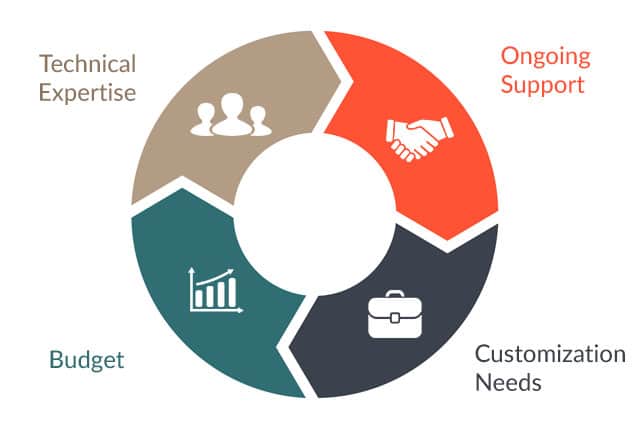
Choosing the Right Higher education CMS in 2024: WordPress vs. Cascade
Tags: CMS for Higher Eduaction,Wordpress CMS Vs. Cascade CMS


Have you been struggling to attract students with your clunky website? The solution is likely in choosing the right CMS for your university. The modern world of higher education has become a competitive landscape. In the face of such an environment, a user-friendly and informative website is no longer a luxury. It is, in fact, a necessity. This is because your prospective students now form their first impressions of your university online. So, if they have to navigate a slow and outdated website, they may choose to click away instead of applying. This is where Content Management Systems (CMS) come in. This is also the reason why CMSs are deemed to be such a powerful part of the equation.
For universities looking to showcase their academic programs, vibrant campus, etc. two content management systems stand out: WordPress and Cascade. Given that these two fare among the top choices, it goes without saying that both offer robust features and functionalities. But which one best suits your institution’s specific needs? That is exactly what I will answer in this blog post. We will discuss the strengths and considerations of WordPress and Cascade, helping you choose the right CMS for your university.
Higher Education CMS: Striking a Balance

Universities and colleges in the US must contend with a complex web of website management needs. Unlike corporate websites, a higher education institution caters to a diverse audience – prospective students, current students, faculty, staff, alumni, etc. This necessitates a CMS that strikes a balance between:
Content Management Versatility
University websites must host a wide variety of content types – program descriptions, news updates, faculty profiles, and on and on. The CMS, then, provides ample flexible tools to enable management of text, images, videos, and other multimedia without a fuss.
Mobile-First Responsiveness
It is no secret that today’s students are forever on the go. The university website, hence, needs to be responsive, delivering an optimal user experience across desktop computers, tablets, and smartphones. A mobile-friendly CMS ensures your website remains accessible and engaging for all visitors, regardless of their device.
System Integrations
Universities today rely on an ecosystem worth of interconnected systems, such as student portals, admissions applications, financial aid platforms, etc. A well-suited CMS, then, must integrate with these existing systems, streamlining data flow and user experience.
Robust Security Features
Protecting sensitive student data is of paramount importance, of course. This is why the chosen CMS must offer security features such as user authentication, data encryption, and regular security updates. Such robust security features, in turn, help you safeguard FERPA (Family Educational Rights and Privacy Act) protected information.
Granular User Access Controls
Multiple departments and content creators need secure access to publish and update information relevant to their department. The CMS must allow for role-based permissions, ensuring only authorized users can access the back-end and edit specific content.
Head-to-Head: Should You Build Your University Website with WordPress or Cascade CMS?

Picking the right CMS for your university website depends on understanding the strengths and limitations of WordPress and Cascade. Since both offer distinct advantages, the ideal choice will hinge on your institution’s specific needs and technical expertise. Read on to look at the specifics of the comparison between these two platforms.
Features
WordPress offers a lot of plugins for any functionality you can think of. But remember that it will necessitate installation and configuration. The Cascade CMS, on the other hand, gets built-in tools specifically designed for university needs, such as event calendars, user permissions, etc. However, this one also tends to lack the sheer variety of plugins as compared to WordPress.
Pricing
Since WordPress is open source, it is free to use. Nonetheless, it can involve additional costs for themes, premium plugins, hosting, etc. Whereas, Cascade CMS is offered with a licensing fee, which typically includes hosting and ongoing support.
Web Content Creation & Management
WordPress gets a user-friendly interface with a WYSIWYG editor. This makes it easy even for non-technical users to create and update content. The Cascade CMS too offers a WYSIWYG editor, but it may involve a steeper learning curve with specific university-focused functionalities.
Ease of Use
WordPress is considered easier to use, especially for those who have no prior coding experience. Using Cascade CMS requires training for content creators due to some of its pre-built features.
Flexibility
WordPress is largely considered highly flexible due to its open-source nature and vast plugin ecosystem. Given that, the customization possibilities with WordPress are practically endless. This is not the case with Cascade CMS, which offers some customization options, but less flexibility as compared to WordPress. Cascade misses flexibility only because it is a closed-source CMS.
Community
WordPress enjoys a massive and highly active global community of users and developers. This translates into extensive support, resources, and tutorials. Cascade CMS has a smaller, more specialized community focused on higher education. Hence, the support and resources tend to be more limited.
Aligning Your CMS Choice with Your Institution’s Goals: Choosing the Right Higher Education CMS

Choosing the right CMS for your university website demands a tailored approach; i.e. there is no one-size-fits-all solution. So, make sure to consider these factors to align your choice of CMS with your institution’s goals:
- Technical Expertise: Do you have an IT team comfortable managing a complex system, or is user-friendliness essential?
- Budget: While WordPress is free, ongoing costs for themes, plugins, and hosting can quickly add up. Cascade CMS has a licensing fee but may include hosting and support, thus offering long-term value.
- Customization Needs: How much control do you need over website design and features? WordPress offers vast customization options, while Cascade provides pre-built features albeit with less flexibility.
- Ongoing Support: Does your team have the resources to handle technical issues and development? Cascade’s dedicated support could be a deciding factor.
The Right Fit, Every Time: eWay Corp’s Experience with WordPress and Cascade for University Websites

At eWay Corp, we understand that choosing the right CMS is a crucial decision for your university’s online presence and success. That is why we leverage our extensive experience building websites and higher education CMS on both WordPress and Cascade.
With over 400 successful projects under our belt, we have honed our skills in assessing each university’s unique needs and recommending the most suitable university website CMS. Whether your priorities lie in user-friendly content creation with WordPress or robust security and built-in university features with Cascade, our team will guide you towards the perfect fit for you.
Furthermore, we offer a unique budget guarantee. If your project goes over the budget due to us, we will cover a month’s worth of your revenue. This commitment reflects our confidence in our ability to deliver successful and cost-effective website solutions.
Contact eWay Corp today for a free consultation. Let us discuss your website goals and identify the ideal CMS platform for your institution.


